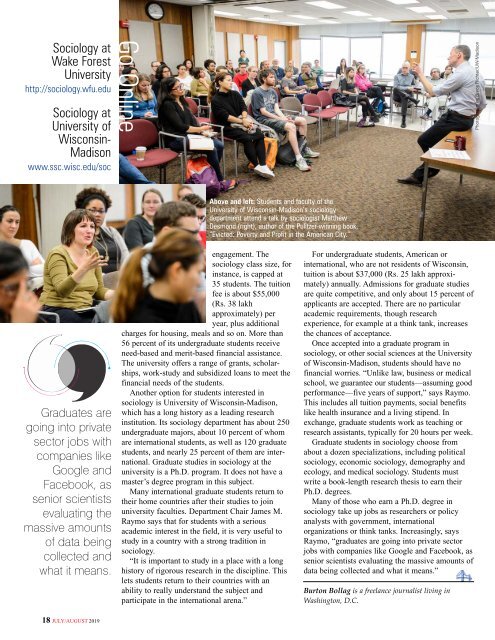July-August 2019
You also want an ePaper? Increase the reach of your titles
YUMPU automatically turns print PDFs into web optimized ePapers that Google loves.
Sociology at<br />
Wake Forest<br />
University<br />
http://sociology.wfu.edu<br />
Sociology at<br />
University of<br />
Wisconsin-<br />
Madison<br />
www.ssc.wisc.edu/soc<br />
Go Online<br />
Photographs by Bryce Richter/UW-Madison<br />
Above and left: Students and faculty of the<br />
University of Wisconsin-Madison’s sociology<br />
department attend a talk by sociologist Matthew<br />
Desmond (right), author of the Pulitzer-winning book,<br />
“Evicted: Poverty and Profit in the American City.”<br />
Graduates are<br />
going into private<br />
sector jobs with<br />
companies like<br />
Google and<br />
Facebook, as<br />
senior scientists<br />
evaluating the<br />
massive amounts<br />
of data being<br />
collected and<br />
what it means.<br />
engagement. The<br />
sociology class size, for<br />
instance, is capped at<br />
35 students. The tuition<br />
fee is about $55,000<br />
(Rs. 38 lakh<br />
approximately) per<br />
year, plus additional<br />
charges for housing, meals and so on. More than<br />
56 percent of its undergraduate students receive<br />
need-based and merit-based financial assistance.<br />
The university offers a range of grants, scholarships,<br />
work-study and subsidized loans to meet the<br />
financial needs of the students.<br />
Another option for students interested in<br />
sociology is University of Wisconsin-Madison,<br />
which has a long history as a leading research<br />
institution. Its sociology department has about 250<br />
undergraduate majors, about 10 percent of whom<br />
are international students, as well as 120 graduate<br />
students, and nearly 25 percent of them are international.<br />
Graduate studies in sociology at the<br />
university is a Ph.D. program. It does not have a<br />
master’s degree program in this subject.<br />
Many international graduate students return to<br />
their home countries after their studies to join<br />
university faculties. Department Chair James M.<br />
Raymo says that for students with a serious<br />
academic interest in the field, it is very useful to<br />
study in a country with a strong tradition in<br />
sociology.<br />
“It is important to study in a place with a long<br />
history of rigorous research in the discipline. This<br />
lets students return to their countries with an<br />
ability to really understand the subject and<br />
participate in the international arena.”<br />
For undergraduate students, American or<br />
international, who are not residents of Wisconsin,<br />
tuition is about $37,000 (Rs. 25 lakh approximately)<br />
annually. Admissions for graduate studies<br />
are quite competitive, and only about 15 percent of<br />
applicants are accepted. There are no particular<br />
academic requirements, though research<br />
experience, for example at a think tank, increases<br />
the chances of acceptance.<br />
Once accepted into a graduate program in<br />
sociology, or other social sciences at the University<br />
of Wisconsin-Madison, students should have no<br />
financial worries. “Unlike law, business or medical<br />
school, we guarantee our students—assuming good<br />
performance—five years of support,” says Raymo.<br />
This includes all tuition payments, social benefits<br />
like health insurance and a living stipend. In<br />
exchange, graduate students work as teaching or<br />
research assistants, typically for 20 hours per week.<br />
Graduate students in sociology choose from<br />
about a dozen specializations, including political<br />
sociology, economic sociology, demography and<br />
ecology, and medical sociology. Students must<br />
write a book-length research thesis to earn their<br />
Ph.D. degrees.<br />
Many of those who earn a Ph.D. degree in<br />
sociology take up jobs as researchers or policy<br />
analysts with government, international<br />
organizations or think tanks. Increasingly, says<br />
Raymo, “graduates are going into private sector<br />
jobs with companies like Google and Facebook, as<br />
senior scientists evaluating the massive amounts of<br />
data being collected and what it means.”<br />
Burton Bollag is a freelance journalist living in<br />
Washington, D.C.<br />
18 JULY/AUGUST <strong>2019</strong>



